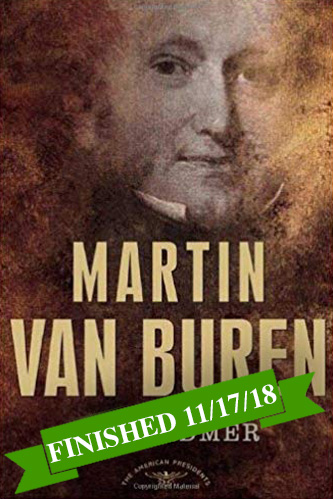Martin Van Buren by Ted Widmer
I have yet to give up on a book in my project, but it finally happened with Martin Van Buren. The unfortunate pairing of the first president I wasn’t particularly interested in with a dry, fairly academic biography written in the 1980s finally did me in. The offending tome was Martin Van Buren and the American Political System by Donald Cole and…I just couldn’t do it.
I got through about 50 pages but there was such a flurry of politicians, events, bills, and minor details that I just wasn’t learning anything about the man other than obscure ephemera. It was sheer drudgery, and unlike John Quincy Adams, my capacity for it is limited.
And so, I set the book down and faced with a dearth of others to choose from (Van Buren doesn’t elicit the kind of prolific authorship as, say, Abe Lincoln) I settled on my first foray into The American Presidents series. This series of books will no doubt be familiar to anyone endeavoring to read a biography of every executive office-holder as I am. Edited by Arthur Schlesinger Jr. and Sean Wilentz, the ongoing effort aims to offer up concise yet substantive accounts of every US president.
Ted Widmer’s contribution weighs in at a very manageable 189 pages and yet I almost immediately felt as if I was learning a lot about the Little Magician due to Widmer’s broader approach. Of course, like Jackson, I had already read quite a bit about Van Buren by this time as he features extensively in What Hath God Wrought, The Life of Andrew Jackson, and even makes occasional appearances in Wedding of the Waters (where he featured as a constant thorn in the side of Erie Canal-booster DeWitt Clinton.)
My initial impressions of Van Buren from previous readings were of a soulless politician who cared for nothing other than his own advancement (he was against the canal before he was for it, for instance.) Even his courting and electioneering for Andrew Jackson reeked of careerism more than principle so I was prepared to come away from Widmer’s book with a sour taste in my mouth. And yet…
Every president I’ve encountered so far reveals men who are multi-faceted and difficult to either venerate or outright detest. Each of them has qualities that are admirable and loathsome (other than John and John Quincy Adams, they’ve all been slaveholders for instance), but I’ve come away with grudging admiration even for those, like Jackson, that I was prepared to dislike. Van Buren was no exception. In fact, in many ways, he’s the most likable chief executive I’ve met thus far.
Born in Kinderhook, NY to Dutch-American parents, Van Buren holds the distinction of being the only American president to speak English as a second language. Interestingly, he’s also the first president born as an American citizen (as opposed to a subject of the British empire.)
Having been a part of the first generation of American political figures that were neither Founders nor Revolutionary War veterans, he nonetheless found himself a part of one of the young republic’s most brilliant sets of statesmen including Henry Clay, Daniel Webster, and John C. Calhoun (the so-called Great Triumvirate.) Along with Van Buren, these men represented the Second Party System of the United States, the days of the Federalists and Jeffersonian Republicans having given way to the modern Democratic party and the Whigs (so-named in reference to their resistance to Jackson’s “tyrannical” executive despotism).
Van Buren, for his part, invented the modern political system that we know today and had a hand in extending suffrage to a much broader swath of white American men than ever before (hey, baby steps). The so-called Era of Good Feelings under President Monroe felt like anything but to Van Buren as he had an inside look at how personality clashes and sectional differences were, at least behind the scenes, driving discord and selfishness. He envisioned a return to the two-party system of old where principles and ideology would drive debate rather than self-interest.
As a member of the New York Senate, he became leader of the Bucktails, a faction of the Democratic-Republicans that made life hell for Governor DeWitt Clinton (at least until they made peace with him…and then didn’t. Politics, man.)
The Sly Fox of Kinderhook (Van Buren earned lots of nicknames) was the ultimate political fixer, the man behind the scenes that had mastered the system. A brilliant and natural politician, he managed to be well-liked by almost everyone whilst being ideologically flexible in order to win elections for both himself and his allies. Though, like any effective politician, he cultivated his share of enemies as well. It could have been Van Buren rather than Burr singing the line from Hamilton: An American Musical, “Talk less, smile more, don’t let them know what you’re against or what you’re for…” In fact, Burr was an early hero and mentor to Van Buren.
This gift for equivocation which served him so well as party mastermind became his undoing as president. A single-term that was most notable for an economic crisis stemming from the Jackson administration, his was a mostly tepid presidency.
Ultimately, Van Buren’s most interesting and consequential period was probably his time as principal advisor to President Jackson and as his second-term vice president. He wielded considerable influence during this period and was perhaps Jackson’s closest confident and counselor despite their marked differences in height, temperament, and political style.
As for Widmer’s book, it is perfectly suited to its subject. Neither a deep dive nor a cursory examination, it’s highly readable, well-paced, and ultimately edifying. Van Buren deserves a great modern biography and if he gets one someday (I would love to see James Traub at the helm) I’ll be sure to pick it up as Van Buren is a fascinating figure that was at the center and was often the puppet master, of the tumultuous political whirlwinds of his time.

